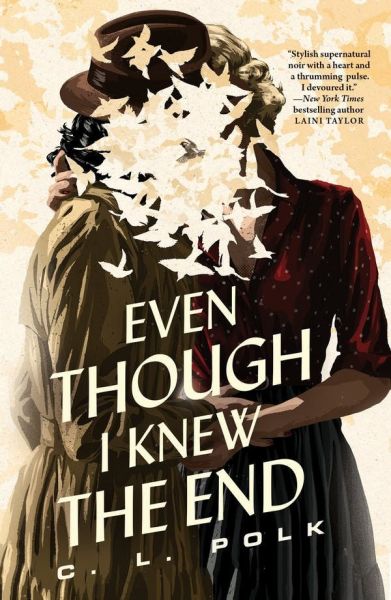My Soul to Keep
Even Though I Knew the End
By C. L. Polk

20 May, 2022
C. L. Polk’s 2022 Even Though I Knew the End is a stand-alone modern fantasy novel.
Helen Brandt, disgraced sorcerer, formerly of the Brotherhood of the Compass, now ekes out a precarious living as an investigative warlock. A client asks her to investigate a murder scene, latest of the so-called White City Vampire serial killings. The scene reeks of powerful magic. Helen takes photos and prepares to leave, when she is interrupted by former colleagues from the Brotherhood of the Compass, who warn her away.
Helen very much wants to please her client, Marlowe. The pay is lucrative and will add to the nest egg Helen plans to leave her girlfriend Edith. It will be a great help to Edith in her (planned) new life in San Francisco. But it will be a life without Helen. Helen knows she will die January 13, three days away. That’s something Edith doesn’t know.
Helen’s America is the America of 19411, with all its virtues and prejudices intact. There’s one major difference: magic is real. Desperate people can bargain with infernal beings for favours, as Helen did: her brother’s life for her soul, to be collected ten years after the bargain was made2.
Just because she will surely die once three days have passed does not mean that death cannot claim her before January 13. Death as wielded by the White City Vampire, who clearly commands some very dark magic. It might be a good idea to tell Marlowe that she cannot do the job and forfeit the pay. However, Marlowe is a demon who dangles an incentive Helen cannot turn down. Marlowe has acquired Helen’s spiritual IOU. Satisfy Marlowe, Helen’s soul won’t be collected, and she can enjoy as much bliss with Edith as they can arrange before the natural order of mortal life ends their time together.
Bad cases have a way of turning out be much worse than expected once private investigators get in too deep to back out.
~oOo~
This book won’t be out for a while. I probably shouldn’t be tantalizing my readers but … consider this a marshmallow test that I’ve failed. There’s no second marshmallow to be had, so why not enjoy myself by reading the book and writing a review while the book is fresh in my memory? (Yeah, I suppose I could write the review and then pigeonhole it until publication day. If I were sure I would remember to publish it …)
Ignore footnote 1, because this novel isn’t billed as hard fantasy. It’s a PI story like The Big Sleep or The Maltese Falcon. Or perhaps the time that PI H.P. Lovecraft was hired to find a book called the Necronomicon. Read as such, it has everything one might want in such a story:
- a morally compromised but not that mortally compromised detective
- a client who left out certain important, need-to-know details
- a love-interest who, as it happens, has some secrets of her own
- authority figures who range from unhelpful to actively hostile
Points one and three made me somewhat pessimistic about Helen and Edith’s long-term prospects, what with their habit of not telling the other about stuff they think might upset their sweetheart. On the plus side, this is the sort of story in which it would be a huge win for the pair if they reached a point where long-term prospects would be a consideration at all.
I like fantasy; I like stories about PIs whose careers show what happens when you make terrible life choices from the best of motives. This book is both. It’s well-written and moves fast. I liked it a lot; you may like it too.
Even Though I Knew the End is available for pre-order here (Amazon US), here (Amazon Canada), here (Amazon UK), here (Barnes & Noble), here (Book Depository), and here (Chapters-Indigo). Inexplicably, Chapters alone declines to show the book’s cover, which is of two women kissing.
[added after posting]
Polk has a Go Fund Me! Please consider contributing.
Good morning!
— C.L. Polk (@clpolk) May 20, 2022
Here goes:
I’ve started a GoFundMe to ask you for money so I can do drugs for a month. Therapeutically!
Well, it’s a long story, but first, here’s the link: https://t.co/cbat8VAV2g
1: A digression on world-building and one reviewer’s unfair expectations pertaining to same. This is a world where
- mortals can (if they choose) poke a demon with a stick (not recommended);
- magical rituals have a tangible, measurable effect that any scientist could easily verify.
Religion in this setting is not entirely a matter of faith (although enough faith is demanded of adherents to drive the plot). It’s as undeniable as a stubbed toe.
And yet … somehow the setting is 1941 America plus ancient magic. This is utterly implausible. The whole course of history would have been different! But a plausible history would be a lot of work to gin up, so the author just picks a historical period and adds magic! As de Bodard did with her Paris Despite Literal Angels Literally Falling Out of the Sky. And so many other books. Sigh.
2: “Well, so much for bargaining for eternal life,” I hear some of you say. Not so! People can bargain with demons for life eternal and get it. It’s just that most of it will involve being nipple-deep in bubbling tar while bored devils prod one with pitchforks.
